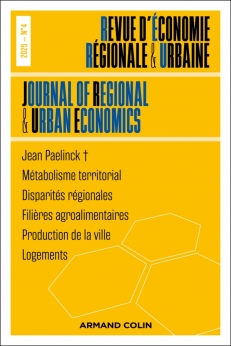
REVUE D'ÉCONOMIE RÉGIONALE ET URBAINE (4/2025)
Pour acheter ce numéro, contactez-nous
Recevez les numéros de l'année en cours et accédez à l'intégralité des articles en ligne.
Face à l’accentuation des inégalités territoriales, les dynamiques de développement territorialisées contribuent à une autonomisation rurale. Dans les territoires ruraux, l’activité agricole est une opportunité de circularisation des économies locales. Cet article s’intéresse à la filière microbrassicole gersoise (émergente), afin d’identifier les ressources susceptibles de faciliter les processus de circularisation au sein d’un territoire. Le cadre conceptuel structuré par l’approche des capitaux communautaires, le concept d’environnement capacitant et celui des 7 C’s. Une analyse thématique d’entretiens semi-directifs menés avec les microbrasseurs gersois permet d’examiner leurs expériences et leurs perceptions des freins et opportunités à la structuration de la filière. Les résultats, qui articulent les dimensions individuelle et collective des démarches entrepreneuriales, montrent que le territoire dispose de nombreuses ressources pour soutenir la filière et que leur activation par des organismes consulaires et publics, tels que la Chambre d’Agriculture et les sites délocalisés de l’enseignement supérieur, est un atout.
In face of increasing territorial inequalities, and in a political context characterized by regional development policies centered on metropolitan areas, we advocate for territorialized development dynamics based on rural empowerment. In rural areas, supporting the viability of the agricultural sectoral is an opportunity for the circularization of local economies. Despite the constraints resulting from low population densities and long distances to urban centers, food processing often requires close geographic and social proximities to agricultural production areas. This article focuses on the circularization opportunities triggered by an emerging microbrewery sector in order to identify the resources likely to facilitate circularization processes. The conceptual framework is structured by the community capitals framework to identify specific territorial resources, the concept of capacitating environments to identify specific territorial resources triggering empowerment dynamics, and the 7 C’s concept which focuses specifically on the elements facilitating circularization dynamics. A thematic analysis of semi-directive interviews conducted with Gers microbrewers analyzes their experiences and perceptions of the barriers and opportunities for structuring a circular microbrewery sector in the Gers department. The results, which articulate the individual and collective dimensions of entrepreneurial initiatives, show that while many resources are available in the Gers department to support the microbrewery sector, their activation by consular and public bodies such as the Chamber of Agriculture and local higher education institutions is an asset. They also demonstrate that available local capitals open opportunities for the development of a circularized entrepreneurial ecosystem centered around beer production. The development of this microbrewery sector represents a means to generate and anchor value in the territory, thereby contributing to its empowerment.